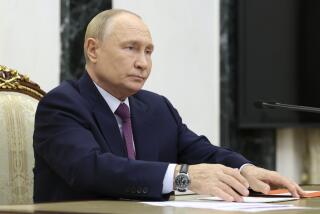Obama’s nuclear policy walks careful line
- Share via
Reporting from Washington — President Obama and his senior aides introduced a new nuclear weapons policy Tuesday with the promise that America would no longer build new nuclear weapons.
“No new testing, no new warheads,” Marine Gen. James Cartwright, vice chairman of the Joint Chiefs of Staff, pledged in a Pentagon briefing.
Yet officials said later that the policy could allow them to bring back older, tested warhead components and designs to build what would be, for all practical purposes, a new weapon.
The administration’s hedge on the warhead issue was but one example of the caution built into a policy portrayed as a groundbreaking effort to reduce U.S. reliance on nuclear weapons.
Although Obama campaigned on a pledge to overhaul nuclear policy, administration officials listened closely to the more conservative advice of Pentagon officials in a yearlong study, said people close to the discussions. And they were sensitive to the need to win Republican votes in the Senate for ratification this year of a new arms control treaty with Russia.
The nuclear weapons policy sets limits on the use of U.S. warheads, declaring some countries off-limits even in wartime, as a step toward reducing U.S. reliance on its most destructive weapons.
The new policy came two days before Obama travels to Prague, Czech Republic, to sign the new arms reduction treaty with Russia and the week before he holds an international nuclear summit in Washington.
There was strong pressure from arms control advocates for a new policy that declares that the “sole purpose” of nuclear weapons is to deter others from using them.
But the administration stopped short of such a statement to preserve the option of using nuclear weapons to counter a non-nuclear threat.
One of the most visible changes in the new policy was the declaration that nuclear weapons would not be used against non-nuclear countries that complied with the Nuclear Nonproliferation Treaty, even if those countries attacked the U.S. with chemical or biological weapons.
Yet the pledge was accompanied by a caveat that the administration reserves the right to set it aside if the destructive level of the attack warranted it.
Release of the review brought quick criticism from some conservatives.
Republican Sens. John McCain and Jon Kyl, both of Arizona, said they were concerned that the new policy was sacrificing American options.
However, other conservatives saw less to worry about.
Henry Sokolski, a senior Defense official under President George H.W. Bush and executive director of the Washington-based Nonproliferation Policy Education Center, said that although the new approach meant the U.S. could no longer target, for example, Brazil with nuclear weapons, “we could still use them against Iran, North Korea, China, Russia.”
“Bottom line: this new position changes very little,” he wrote in an e-mail.
Julian E. Barnes in the Washington bureau contributed to this report.
More to Read
Get the L.A. Times Politics newsletter
Deeply reported insights into legislation, politics and policy from Sacramento, Washington and beyond. In your inbox three times per week.
You may occasionally receive promotional content from the Los Angeles Times.











